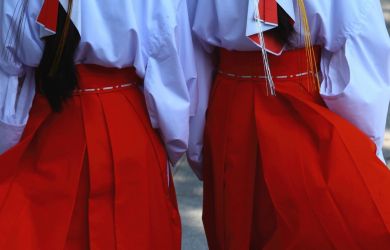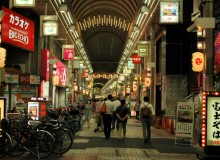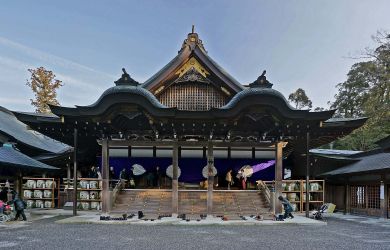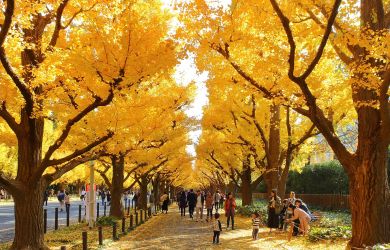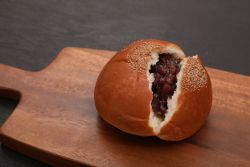
Originally published on metropolis.co.jp on November 2008

Not all water is created equal. Ask any onsen aficionado or operator, and they will tell you that much. One Tokyo public bath may be pumping water from a different source than its neighbor. There are a myriad different minerals and combinations found in true geothermal water with varying therapeutic effects—too many to list here in their entirety. But you don’t need science to tell you that a leisurely soaking in hot water is good for you.
What we can list here for you are a few of the better hot springs in the Tokyo area, so you can let off some steam and give your body a treat without having to travel far from home. True, most people associate onsen with rustic inns tucked away in some mountain hamlet—and perhaps that’s where you may have to travel to get the most luxurious bathing experience—but several Tokyo facilities are hardly lacking in elegance and charm. Some come with a few added bonuses as well, so save on travel time and check out the city’s best hot springs.

One of Tokyo’s newest and most interesting baths is the Oedo Onsen Monogatari, which opened in Odaiba in 2003 to much fanfare. But this is not just a bathing facility—it actually fashions itself more a theme park modeled on the Edo era (1603-1868), with a “main street” lined with period shops, game arcades and no less than 16 restaurants.
Of course, there are still a number of baths—take our advice and head for the two premier ones that pump all-natural hot-spring water from 1,400 meters underground. One of these, Kogane-no-Yu, uses water from closer to the thermal spring source, resulting in a richer consistency of minerals and a slightly rose color. The resort boasts that it will leave a slight film on your skin (not unusual for onsen water, actually) that will be absorbed to therapeutic benefit—so don’t dry off too quickly!
Beyond these two, there are a number of other baths that don’t use pure onsen water, but are still worth dipping into. One has water that’s activated with micro-bubbles for a particularly soothing water massage. Another, the Hyakunin, is appropriately named for its considerable size.
But the highlight for most people at any onsen is the rotenburo, or open-air bath. At the Oedo, they are somewhat ordinary, though for the women there is a large wooden tub. There is additionally a large footbath that men and women can share. Sit on the side in your yukata (provided upon entry, along with a towel) and submerge your feet. Or even better, stroll through it—there are rounded stones on the bottom specially designed to massage your tired dogs. For an extra fee, you can also enjoy the so-called “sand baths,” in which heated sand is packed around you. Surrounding the footbath are over 2,300m2 of landscaped gardens.
2-57 Aomi, Koto-ku. Tel: 03-5500-1126. Open daily 11am-9am. Nearest stn: Telecom Center (Yurikamome line). Free shuttle buses depart from several train stations, including Tokyo, Shinagawa and Kinshicho. www.ooedoonsen.jp/english

Perhaps the most convenient onsen for most Tokyo residents is La Qua. This bath is actually a part of the sprawling Tokyo Dome City complex, which is reminiscent of something out of Blade Runner as it reaches with all its bright weirdness into the night sky. With Tokyo Dome, the attached Tokyo Dome Hotel, a theme park complete with roller coasters, ample shopping opportunities and more, families could easy spend a holiday weekend there. But if you’re there to relax, head straight to La Qua.
The building features the onsen, relaxation rooms with massage chairs, a beauty clinic offering facials, and a few passable restaurants. Bathing facilities include a small but gorgeous outdoor bath with some minimalist landscaping and stone inlays, and an inner tub with micro-bubbles that offer a soothing massage.
Again, after you get out, don’t dry off to soon; there are sauna rooms for added muscle tension release. But if you want to see some real saunas, take the elevator up a few floors to the “Healing Baden.” That’s where you’ll find a number of rooms with different levels of heating that are gorgeously designed and wonderful for relaxation. There is even a swank little cool-off room, chilled to 5°C (41°F) and inset with mosaic tiles.
One convenient feature of the La Qua complex is that it operates on a cashless system, so you can enjoy the various facilities, eat at the restaurants and then pay at the end. Note that the facilities were designed with adults in mind, and children under the age of 6 are prohibited.
1-1-1 Kasuga, Bunkyo-ku. Tel: 03-3817- 4173. Open daily 11am-9am. Nearest stn: Korakuen. www.tokyo-dome.co.jp/e/laqua

While Oedo Onsen Monogatari and La Qua attract the crowds because of convenient locations, extended hours and added attractions, you should head to the suburbs if you want to beat the rush. Machida Roten Garden offers nice, relatively quiet facilities and it’s also considerably cheaper than its central Tokyo counterparts. There is an outdoor, rooftop bath that is constructed completely out of wood and stone with an attractive trellis overhead. Since Machida is located away from all the towering city buildings (and smog), watching the molten skies during the winter sunset, or gazing up at the stars later in the evening, is an experience not to be missed.
Roten Garden has another collection of outdoor baths that are much larger, but not nearly as lovely. But at least with these, you’ll get a little more of your own space. The indoor baths feature typical fare: a micro-bubble bath for massage, a standard bath and a low-temperature one for cooling off. Don’t forget the sauna rooms, either—they are nothing to boast about, but perfectly sufficient and quite enjoyable after a soak.
As with most hot spring complexes, this one offers dining options, though they are restricted to Japanese cuisine. If you are going with a group of four people or more, definitely opt for the banquet dinner (reservations required). This is one of those umpteen-course feasts featuring traditional delicacies that you get at traditional onsen inns, but here dinners start at only ¥2,900. For lighter fare and big mugs of frothy beer, there is also a more casual dining area.
358 Aihara-cho, Machida-shi. Tel: 042-774-2681. Open daily 10am-midnight. Nearest stn: Hashimoto. www.haragroup.co.jp/roten
